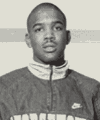David Edwards (1989-1990)
Some transfers leave school over academics, over playing time, or just that the talent didn't match the program. In the case of guard David Edwards, none of these applied. In a brief career at Georgetown, it came down to one strong personality (Edwards) and another strong personality as coach (John Thompson).
"I respect John Thompson, and I think he's a good coach," Edwards told the New York Times in 1993. "[But] me and Coach Thompson didn't see eye to eye."
The son of Dave Edwards, a three time captain at Virginia Commonwealth from 1971-74, the younger Edwards was a star at Andrew Jackson HS in New York, averaging 41 points per game and displaying the street-smart moves of guards common in the Rucker Park League, but wholly unfamiliar at Georgetown, where the guards of the 1980's were built around discipline, defense, and feeding the big men inside.
The 5-10 Edwards burst on the Georgetown scene as a freshman guard, predating the ball handling of Kenny Brunner by nearly a decade. In his debut game, Edwards scored just two points but collected 14 assists, third most in school history at the time. By the time of Big East play, Edwards was averaging nearly eight assists per game, but his improvisation on the court was not well received on the bench and his playing time narrowed as a result.
"I've seen Kenny [Anderson] make a mistake and play 40 minutes," Edwards recalled when playing the All-American in high school. "I'd make one [mistake at Georgetown] and there would go the [coach's] buzzer."
Edwards played in all 31 games, averaging 5.4 points per game and finishing second on the team in assists. He reached a career high of 19 points in the NCAA tournament loss to Xavier, but was already looking for an exit. Edwards received numerous calls from Rob Johnson, a New York based street agent who was alleged to have steered Edwards and Syracuse forward Tony Scott to Texas A&M. As Edwards sat out the 1990-91 season, Davis was fired at Texas A&M and the school was placed on two years probation, with the NCAA alleging that Texas A&M provided funds to Johnson in the form of summer camp compensation to assist in Scott's transfer from Syracuse. In a subsequent investigation, Johnson was found to have ties to a number New York recruits which attended Syracuse, and that school was also placed on NCAA probation.
While Edwards could have left Texas A&M in the wake of the inquiry, instead he became its star. Though the school was not known for its basketball prowess, Edwards was a cornerstone in the rebuilding effort undertaken by Davis's successor, Tony Barone. In three seasons at Texas A&M, Edwards scored 1,167 points (13.5 ppg), was named to the all-Southwest Conference team three straight seasons, and graduated in 1994 with the school's career assist and steals records, a pair of records that stood until 2016. He was the runner up for the 1994 Frances Naismith Award, awarded annually to the top player in the nation under six feet tall.
Edwards' son Corey returned to the Washington area to play college basketball, but at George Mason. In a 2013 Washington Post feature, the elder Edwards acknowledged his issues at Georgetown.
"I wish I could've been more mature after high school," Edwards said. "I could've listened more."
His son added: "My dad definitely gave [Thompson] some of the gray hairs he has."
Edwards played professionally in Lithuania and Iceland before returning to New York in the late 1990s. He became a high school coach at the Mary Louis Academy, a Queens-based Catholic girls high school.
David Edwards died in 2020 during the initial weeks of the COVID-19 epidemic in the New York City area.
| Season | GP | GS | Min | FG | FGA | % | 3FG | 3GA | % | FT | FTA | % | Off | Reb | Avg | PF | Ast | Blk | Stl | Pts | Avg |
|---|---|---|---|---|---|---|---|---|---|---|---|---|---|---|---|---|---|---|---|---|---|
| 1989-90 | 31 | 0 | 628 | 49 | 139 | 35.2 | 13 | 36 | 36.1 | 56 | 83 | 67.4 | 21 | 71 | 2.2 | 50 | 150 | 1 | 42 | 167 | 5.4 |
| Totals | 31 | 0 | 628 | 49 | 139 | 35.2 | 13 | 36 | 36.1 | 56 | 83 | 67.4 | 21 | 71 | 2.2 | 50 | 150 | 1 | 42 | 167 | 5.4 |
